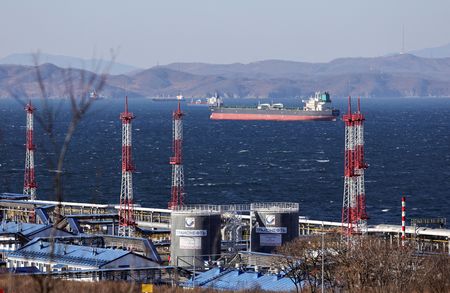By Andrea Shalal
WASHINGTON (Reuters) -The Group of Seven (G7) coalition will keep a $60 per barrel price cap on seaborne Russian oil, a coalition official said, despite rising global crude prices and calls by some countries for a lower price cap to restrict Moscow’s revenues.
The G7 and Australia made the decision to maintain the cap over the past few weeks after a review of the $60 price – set in December with an aim to reduce Moscow’s ability to finance its war in Ukraine, the official said on condition of anonymity.
It comes after four weeks of gains in benchmark oil prices helped by an output cut announced by OPEC+, which groups the Organization of the Petroleum Exporting Countries and allies led by Russia, as well as a recovery in Chinese consumption. [O/R]
The market was consolidating on Monday with Brent and U.S. crude futures holding above $80 per barrel.
Russian crude has been selling at a discount of around $30 to Brent, the official said.
Coalition officials concluded the price cap was working to both limit Russian revenue while maintaining energy market stability, but said they would continue coordinating to ensure effective monitoring and enforcement, the official added.
COMBATING EVASION
The coalition will also intensify efforts to combat evasion of the price cap and sanctions imposed on Russia, including the use of deceptive practices to access insurance and other coalition services for oil traded above the cap.
Coalition members plan to provide guidance to help service providers identify red flags for evasion, such as manipulation of ships’ location tracking or failure to itemize shipping, freight, customs, and insurance costs separately from the oil itself, the official said.
Later on Monday, the U.S. Treasury issued a warning to U.S. companiesof possible evasions of the price cap on oil exported through the Eastern Siberia Pacific Ocean (ESPO) pipeline and ports in eastern Russia. It recommended that traders retain documents showing that Russian oil and oil products were bought at or below the cap.
The oil price cap bans G7 and European Union companies from providing transportation, insurance and financing services for Russian oil and oil products if they are sold above the cap.
The U.S. and Britain have also imposed restrictions on Russian oil imports.
The official noted that a recent International Energy Administration (IEA) report concluded that the G7 sanctions regime had been effective “in not restricting global crude and product supplies, while simultaneously curtailing Russia’s ability to generate export revenue.”
The IEA said on Friday that Russian’s March oil revenue rose by $1 billion month on month to $12.7 billion, but was still 43% lower than a year earlier.
Russian crude exports have been consistent at over 3 million barrels per day and global markets have been steady, the G7 official said.
(Reporting by Andrea Shalal; additional reporting by Timothy Gardner, Editing by Himani Sarkar)

